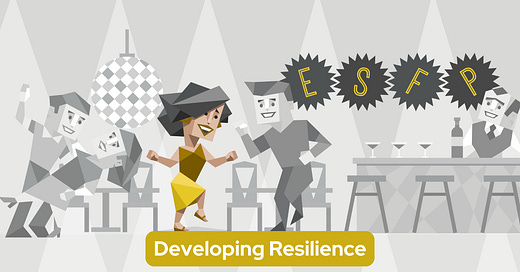Leading Resilient ESFP (Entertainer) Personalities
Watch as Evan the ESFP builds resilience when his boss embraces his spontaneous creativity and enthusiasm in unexpected ways
How to spot ESFPs (Entertainers):
ESFPs (Entertainers) share the Extraverted, Observant, Feeling, and Prospecting personality traits.
They tend to process disappointments out loud, often turning to their social network for support when facing small setbacks. You might notice them engaging in conversations with colleagues, seeking reassurance and encouragement. They also have an amazing ability to find humor in difficult situations, which can help them bounce back and uplift team morale in the process.
Short on time? Scroll to the bottom for a 2-minute TL;DR summary of today’s article.
You’ve just about met all the different sides of Evan – from the Explorer who was at this breaking point to more resilient versions of him as an ESTP (Entrepreneur), an ISFP (Adventurer), and an ISTP (Virtuoso).
Today, say hello to the final side of Evan: Evan the ESFP (Entertainer).
How can we make sure this version of Evan thrives at work, even when challenges put his resilience to the test? Let’s rewind and explore the answer!
As a reminder, three main factors contributed to Evan’s lack of resilience at work:
Feeling like his attempts to share ideas and collaborate were consistently dismissed
Struggling with stifled creativity, leading to self-doubt and a reluctance to contribute ideas
Losing confidence and motivation when his enthusiasm and quick thinking were undervalued
Let’s explore what a positive experience might look like for Evan the ESFP in each of these areas. This insight will help you lead the ESFPs on your team, especially when guiding them through unwelcome challenges.
Story Time: Helping Evan the ESFP Develop Resilience
Let’s set the scene:
Evan the ESFP is sitting at the conference room table, about to propose his augmented reality idea to his boss.
*roll film*
“My attempts to collaborate are welcomed.”
I felt that familiar spark of inspiration. “I’ve got it!” I exclaimed, jumping up. “Let’s use augmented reality to showcase the product features.”
To my surprise, my boss leaned in. “Interesting, Evan. Can you show us?”
Thrilled, I grabbed my tablet and quickly mocked up a rough AR demo. “Imagine pointing your device at our product and seeing this,” I said, letting my colleagues try it out themselves.
The room buzzed with energy as everyone shared ideas. “What if we add sound effects?” “We could make it a game!”
My boss, caught up in the excitement, asked about implementation and resources. Energized, I started brainstorming aloud, incorporating everyone’s input. “We could have a prototype ready by next week!”
By the end, we had a solid plan that everyone was excited about. My boss smiled, “Evan, your hands-on approach really brought this idea to life. Let’s set up a workshop to develop this further.”
I left the meeting feeling energized and valued. This positive experience reinforced the worth of my ESFP traits – my enthusiasm, love for interactive experiences, and ability to energize a room. It also gave me a powerful tool for facing future challenges. I realized that even when I encounter resistance to my ideas, I can draw strength from memories like this one. Knowing that my approach can lead to successful outcomes will help me stay resilient when things don’t go as smoothly. In the future, if my ideas are met with skepticism, I’ll have the confidence to ask for a chance to demonstrate them, just like I did today.
“My boss is encouraging my creativity.”
Keep reading with a 7-day free trial
Subscribe to Leadership by 16Personalities to keep reading this post and get 7 days of free access to the full post archives.





